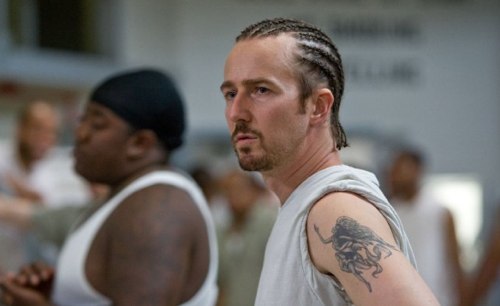Edward Norton on Stone, De Niro's Brain and Non-Sex With Milla Jovovich
What was it like going into the prison and meeting the prisoners, and how did you come up with Stone's strange way of speaking?
I think it's just sort of what you hear in urban Detroit. The two guys that [Stone was] modeled on were both actually from the same part of Detroit, southwest Detroit, which has a very, very distinct [vernacular]. Stone is an imitation of that, exactly. Sixty percent of the actual wording of the way we had [Stone] say things was affected by the way these guys talked. We went through it with them, line by line almost, and said, "This is the intent, but how would you say it?" The script was originally set in the South, and we pretty much just chucked all that when John moved it up to Detroit, and the guys in the prison were invaluable.
What were those guys in for?
Actually both very much what we had Stone set up as: guys who had been involved in the drug trade and the gang life from a very young age, and pretty much been in and out -- through juvie, and everything. One of them in particular was, to me, very poignantly in the same state Stone is in. In fact, he was up for parole this spring, and he was approaching that, and he was extremely, extremely, intensely agitated about it, dwelling on it, very, very forthright about, you know, the fact that he felt, in a weird way, that he had never been given a platform for a sense of a spiritual life, that he'd been cobbling it together. He really was this fascinating kind of grab bag of references from Power of Now to Buddhism primers that he had read to, like, Scientology. He literally was this crazy, autodidactic spiritual cobbler, and it was affecting. He was very affecting. He was the one who had that voice. He had this really shattered, cracky, husky, weird voice.
One of your producers described you as "one of the few actors that can believably terrorize Bob De Niro." What was it like working with De Niro the second time around, and did you effectively terrorize him?
[Laughs.] No, it was good. I think intimidation flows one way from De Niro. I don't think it flows in. But I'm joking. He's not intimidating. If I've ever met a person who had projected onto them an image that does not square with the human that's the artist under all that, it's him. He is so far from that thing that people relate to, and it is amazing. Even though what I love about this film, and him, his performance, I feel like he's investigating this very depressed, and alcoholic, and emotionally distant, sort of withering guy, who maybe was a bully at a point in his life, and these things snap out. But even when those moments come, where that thing snaps out of him, you get this glimpse of, like, that thing, and you just go, knowing him, I marvel at, "Where does that come from in him?" It's really heavy.
The other irony about him is because he's so fantastic, I know this is a weird thing to say, but there are actors who are great on the line, and there are actors who are great off the line, and I look at him as one of the great off-line actors. He's such a weirdly great listener. You know, he's like one of those people who when he's not talking, you're almost more aware of things going on in him. So I think people look at him as a very intuitive actor or whatever, and he's the most right-brained... He is such a clinician and a scientist. He's like a note-taker and a researcher. He's a right-brained details guy until he shoves it through some weird membrane he's got in there, and it becomes this thing.
Your scenes with Milla in the visiting rooms are like sex scenes, but without intercourse. Was that a challenge in shooting them?
No, I don't think I thought that that particularly was a challenge. You know, one of the things I felt about the movie was there's Stone and Lucetta, and there's Stone and Jack, and there's Jack and Lucetta, and there's Jack and [his wife] Madylyn, and if you really look at the film, there's all these two-way conversations, and I kind of think in every one of them, everybody's disconnected. Everybody's failing to hear each other. Jack and his wife, everything they say to each other falls into this void, and with Stone there's no trust, and I think with Stone and Lucetta there's a different kind of a disconnect. She's the most existentially even person in the whole thing. He says [points to his head] she doesn't get in here.
To me their scenes were more about one person for whom it's all pretty simple, and one person for whom it's incredibly complicated and difficult. What's sad, in a way, is she's very pure in her intention to help him, and he needs her so badly in the beginning, and he doesn't need her at all in the end. The only thing that destabilizes her in the movie is him moving from a place where he needs her so much to where he doesn't need her. It wasn't even so much about the sexual connection they had. For us, it was figuring out, what's the nature of their disconnect?
I thought she was great, man. Do you remember Karen Black in Five Easy Pieces? I kept thinking of that. I don't know why. She's gorgeous, but she's so weird. She's dangerous, but she's really got this bizarrely paradoxical innocence to her.
[Top photo credit: Gary Gershoff/WireImage]
Pages: 1 2

